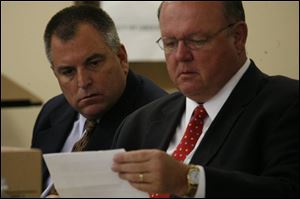
Auditor: BWC limited access to books
7/29/2006
Tom Noe, left, and attorney Bill Wilkinson listen in court. An investigator testified yesterday that he was given bogus documents at Noe's Monclova Township business. STORY, PAGE 3.
The Ohio Bureau of Workers' Compensation's top internal auditor believes the agency's administration kept him from fully examining the books of its $50 million rare-coin venture with Tom Noe because of the GOP fund-raiser's political connections, the auditor testified in a sworn deposition filed yesterday.
In a 200-page deposition filed in Noe's criminal case, auditor Keith Elliott testified that he wanted more access to review the coin funds because of the unusual nature of the investments, but that bureau administrators stood in his way.
"It was widely known that Mr. Noe was politically connected and active and that he was on the [Ohio] Board of Regents , but my assumption is that because they were worried about doing too much would adversely affect his travel schedule or whatever and he might complain to somebody," Mr. Elliott testified.
Noe has pleaded not guilty to charges he engaged in corruption and theft from the $50 million rare-coin funds he managed for the bureau from 1998 through 2005. After The Blade first reported on the coin venture in April, 2005, the bureau ended its investment with Noe and his attorneys eventually told authorities that there could be a shortfall of up to $13 million in the coin funds.
Mr. Elliott, in response to questions from Noe's attorney, John Mitchell, said he had no knowledge of instructions to treat Noe differently because of his political connections and that bureau administrators never told him to go "easy" on the coin dealer.
But Mr. Elliott testified that some bureau administrators did not want to address his concerns about the coin funds.
After a visit to Noe's now-shuttered Monclova Township office in May, 2000, Mr. Elliott testified that he told John Annarino, the bureau's former legal counsel, in a private meeting that the bureau should consider getting out of the coin funds. Mr. Elliott said Mr. Annarino rebuked him for his recommendation.
"During my discussions with him he indicated that [the internal auditor's] job was not to set investment policy and we should restrict our comments to control-related issues," Mr. Elliott said in the deposition.
In telling Mr. Annarino that the bureau should consider cutting ties with the funds, Mr. Elliott said he explained that "there was a lot of negative exposure and at least from a risk-return standpoint [it] didn't seem commensurate with the risk."
A bureau spokesman, Mr. Annarino, and James Conrad, the bureau's former administrator-CEO who resigned amid the scandal, did not return calls last night seeking comment.
Mr. Elliott testified he told bureau officials that he saw a potential for abuse in the investment because the coin funds were involved in purchases outside the scope of rare coins, managers took advances on coin purchases, and related-party trades were allowed.
Asked by Noe's attorneys during the deposition if he felt "vindication" by what's transpired with the coin funds, Mr. Elliott responded, "I guess I just wished they would have listened to me and at least tried to get out of it back then."
Contact Steve Eder at:
seder@theblade.com
or 419-724-6272.